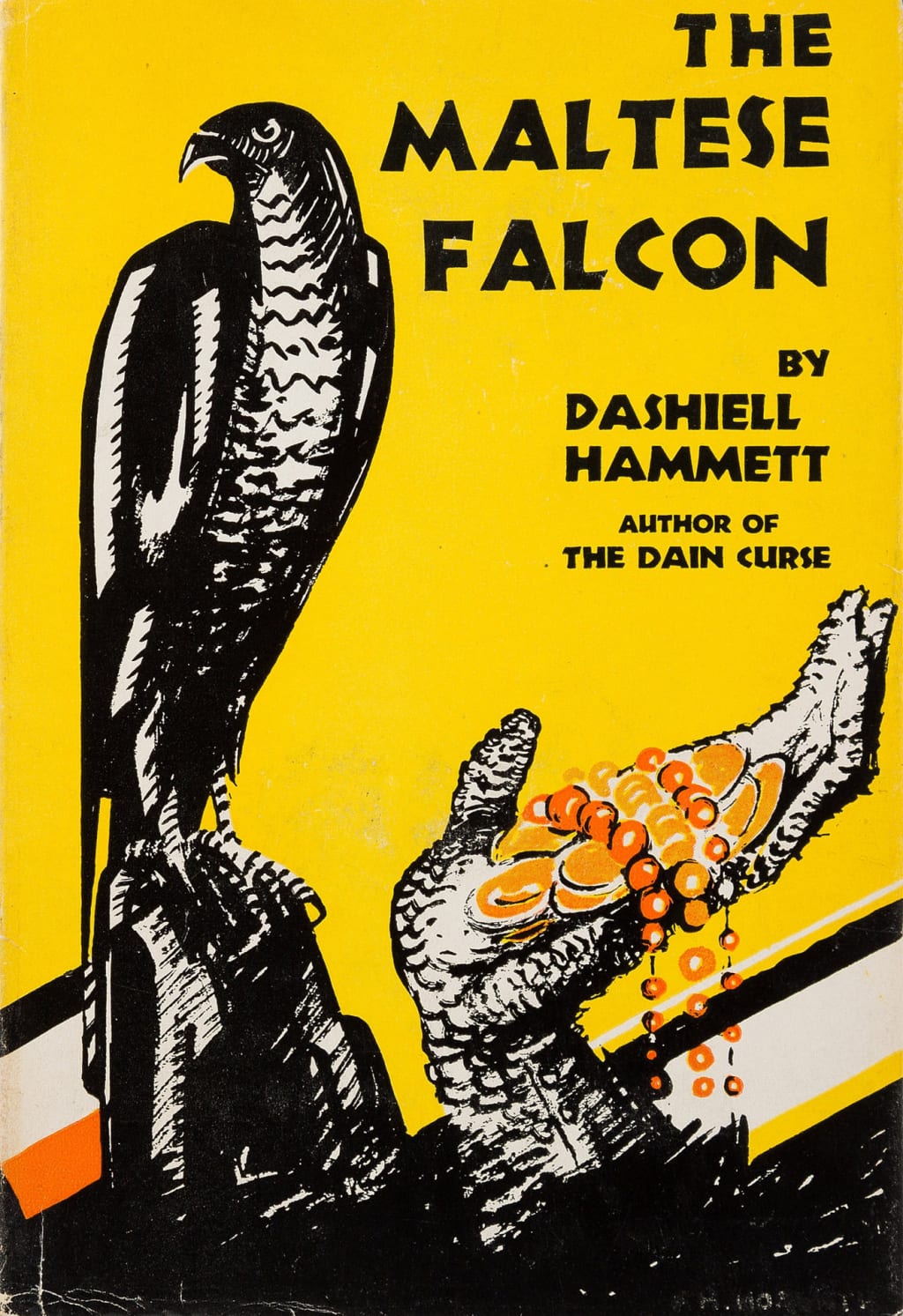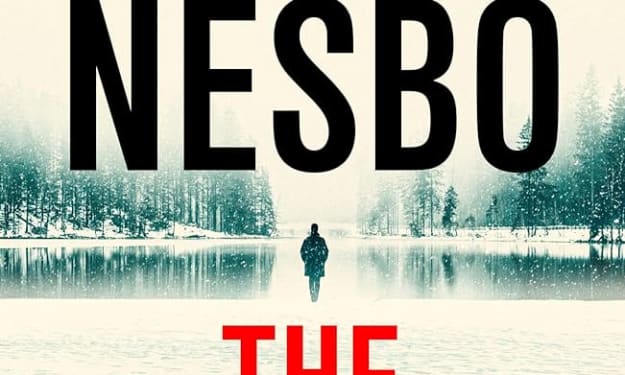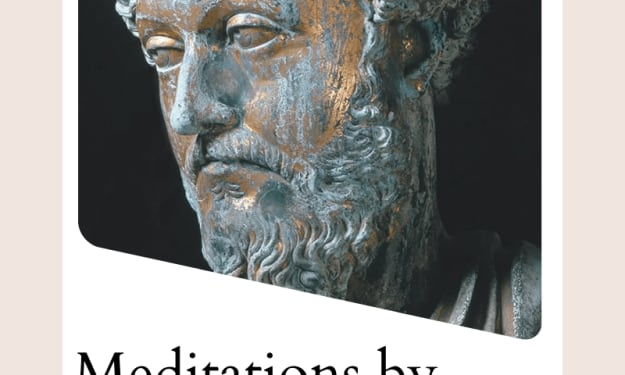"The Maltese Falcon" by Dashiell Hammett - Book Club Discussion
Book club discussion points and review

From "a master of the detective novel [and] one hell of a writer" ( The Boston Globe) comes a coolly glittering gem of detective fiction that has haunted three generations of readers. A treasure worth killing for. Sam Spade, a slightly shopworn private eye with his own solitary code of ethics. A perfumed grafter named Joel Cairo, a fat man name Gutman, and Brigid O'Shaughnessy, a beautiful and treacherous woman whose loyalties shift at the drop of a dime. These are the ingredients of Dashiell Hammett's iconic, influential, and beloved The Maltese Falcon.
About the Author:
- Samuel Dashiell Hammett
- Born May 27, 1894, St. Mary’s County, Md., U.S. - died Jan. 10, 1961, New York City
- Left school at 13 and worked at a variety of low-paying jobs before working eight years as a detective for the Pinkerton agency
- Served in World War I, contracted tuberculosis, and spent the immediate postwar years in army hospitals
- Began to publish short stories and novelettes in pulp magazines and wrote two novels—Red Harvest and The Dain Curse (both published in 1929)
- Before writing The Maltese Falcon (1930), generally considered his finest work
- Also wrote The Glass Key (1931) and The Thin Man (1934)
- After 1934 Hammett devoted his time to left-wing political activities and to the defense of civil liberties
- Served in World War II as an enlisted man
- 1951 he went to jail for six months because he refused to reveal the names of the contributors to the bail bond fund of the Civil Rights Congress, of which he was a trustee
- Hammett spent the last ten years of his life in a small rural cottage in Katonah, New York.
- No longer at the center of the literary world, he continued to drink heavily in isolation.
- In 1955 he suffered a heart attack and died six years later in New York City.
- Though his output was limited to only five novels (depending on outlook), Hammett remains one of the most influential writers of his time. His introduction of the “hard-boiled” genre has had a profound effect on both television and movies.
On Writing the Book:
- Originally appeared as a serial in Black Mask magazine in 1929 and was published in book form next year
- The concluding chapter, in which Spade explains his uncorrupt, even if sometimes accommodating moral code, is among the most influential pieces of writing in American crime fiction, and antiheroes in the Spade mold came to dominate subsequent hard-boiled mysteries.
- The Maltese Falcon is set in the mean, foggy streets of 1920s San Francisco when it was one the largest and busiest deep-water ports in the world. Sam Spade, the hard-boiled, hard-drinking private detective who is the hero of the book, seems to have an affinity with the blackhearted criminals he outsmarts, pretending to be working with them until he is able to uncover the truth behind the series of strange events.
- "Noir,” which means black in French, has come to denote fiction and drama (as in “film noir”) that deal with the dark side of human behavior and explore themes of greed, corruption, betrayal, and the difficulty in distinguishing between good and evil.
Other Writings:
- Series
- Big Knockover
- The Gatewood Caper (1923)
- The Scorched Face (1925)
- Corkscrew (1925)
- The Gutting of Couffignal (1925)
- The Big Knockover (1927) aka $106,000 Blood Money
- This King Business (1928)
- Fly Paper (1929)
- The Big Knockover: and Other Stories (1966)
- Continental Op
- Red Harvest (1929)
- The Dain Curse (1931)
- The Golden Horseshoe (1924)
- The Whosis Kid (1925)
- The Main Death (1927)
- The Farewell Murder (1930)
- The Girl with the Silver Eyes (1924) - novella
- The Tenth Clew (1924) - novella
- The Big Book of the Continental Op (2017)
- Novels
- The Sardonic Star of Tom Doody (1923) (by Peter Collinson)
- The Maltese Falcon (1930)
- The Glass Key (1931)
- Woman in the Dark (1933)
- The Thin Man (1934)
- They Can Only Hang You Once (1944)
- The Creeping Siamese (1950)
- Nightmare Town (1950)
- Nonfiction
- Selected Letters of Dashiell Hammett (2001)
- The Crime Wave (2006)
- Short Stories
- $106,000 Blood Money
- Corkscrew
- Dead Yellow Women
- Fly Paper
- The Gatewood Caper
- The Gutting of Couffignal
- The King Business
- A Man Called Spade
- The Scorched Face
- Tulip
TV & Movies:
- Monsieur Spade (based on characters by) - 2023
- Cineficción Radio (The Maltese Falcon radio show) - 2021
- No Good Deed (based on a story by) - 2002
- Fallen Angel (based on a short story by) - 1993-1996
- Miller's Crossing (based on Red Harvest and Glass Key) - 1990
- Bande (based on Glass Key) - 1986
- When the Raven Flies (based on Red Harvest and Glass Key) - 1984
- The Wizard of Malta (based on The Maltese Falcon) - 1981
- The Dain Curse (based on the novel by) - 1978
- The Last Round (based on the book by) - 1976
- The Black Bird (based on characters by) - 1975
- The Wide World of Mystery (based on characters by) - 1973-1976
- The Thin Man (based on characters by) - 1957-1959
- The Fat Man (based on characters by) - 1951
- Song of the Thin Man (based on characters by) - 1947
- The Thin Man Goes Home (based on characters by) - 1944
- Watch on the Rhine (screenplay by) - 1943
- The Glass Key (based on the novel by) - 1942
- Shadow of the Thin Man (based on characters by) - 1941
- The Maltese Falcon (based on the novel by) - 1941
- Another Thin Man (based on characters by) - 1939
- After the Thin Man (based on characters by) - 1936
- Satan Met a Lady (based on the novel by) - 1936
- Mister Dynamite (based on On The Make) - 1935
- Woman in the Dark (based on a story by) - 1934
- The Thin Man (based on the novel by) - 1934
- The Maltese Falcon (based on the novel by) - 1931
- City Streets (based on a story by) - 1931
- Roadhouse Nights (screenplay by; based on Red Harvest) - 1930
Discussion Questions:
- Sam Spade's personal motivations are often difficult to decipher. Is Spade committed to his profession? Does he follow a moral code of conduct, or does he operate mostly on self-interest? Is he a hero or an antihero?
- In what ways do money and greed motivate the characters in the novel? What might Hammett be saying about the relentless pursuit of wealth?
- Sam Spade's attitude toward authority is patently clear in remarks like "It's a long while since I burst out crying because policemen didn't like me" or "At one time or another I've had to tell everyone from the Supreme Court down to go to hell, and I've got away with it". How is Spade's distrust of power manifested in his actions? How important is distrust as an aspect of his character?
- When Spade returns to the office in the last scene, Effie does not greet him with her usual verve. What has happened to the breezily affectionate bond between them? What is Effie's relationship with Brigid? Will Effie forgive Spade, or do we not know enough about her to make predictions?
- How is Spade different from other famous literary detectives such as Sherlock Holmes – both as a person and as a detective?
- How does the urban setting contribute to the novel’s mood and tone? Does the city itself become one of the “characters”?
- Is the falcon a symbol? If so, what does it symbolize? Does the falcon have a different meaning for different characters? Is there a real Maltese Falcon?
- Spade has an uneasy set of morals. A prime example is his investigation of his partner’s murder: he did not like him and was having an affair with his wife, but still feels compelled to “do something about” his murder. After the murder Spade also discards the widow, trying to remove her from him as well. And later, when the truth is revealed about O'Shaughnessy and she pleads with him not to get them to turn her in, he coolly admits that he loves her, but that he can’t turn a blind eye to her actions. In the end, his morals come out on top. What does this say about his character and his code of ethics? What does it say about society being willing to tolerate the bending of laws, but holding others against any transgression?
- The reader discovers some parts of the mystery at the same time as the detective, and other parts much later. At what point did you solve the crime?
- What motivates Sam Spade to find the falcon? Is he tempted by money or Brigid, or does he merely love the chase?
- Are Sam Spade’s actions in the novel’s final scene consistent with his character? What would you have done in his place?
About the Creator
Kristen Barenthaler
Curious adventurer. Crazed reader. Archery fanatic. Amateur author. Librarian.
Instagram: @kristenbarenthaler
Facebook: @kbarenthaler
GoodReads: https://www.goodreads.com/author/show/15101108.Kristen_Barenthaler






Comments
There are no comments for this story
Be the first to respond and start the conversation.